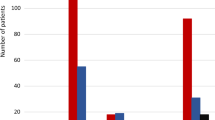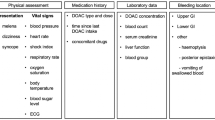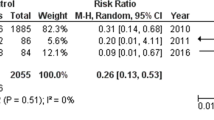Abstract
Objectives
To study the risk of serious upper gastrointestinal (GI) events associated with the concurrent use of selective serotonin re-uptake inhibitors (SSRIs) and different types of non-steroidal anti-inflammatory drugs (NSAIDs).
Methods
This was a nationwide, register-based matched case-control study on non-institutionalized residents of Finland during the period 2000–2004. Patient-cases with serious upper GI events (n = 9191) were drawn from the Hospital Discharge Register, and individually matched controls (n = 41,780) were drawn from the Population Register. Logistic regression was applied in the data analysis, and adjustments were made for various co-morbidities and the use of other drugs associated with the risk of serious upper GI event.
Results
The adjusted odds ratio (AOR) of serious upper GI events for SSRI use compared to non-use of SSRIs or NSAIDs was 1.30 [95% confidence interval (95%CI: 1.13–1.50)], and the AOR for concurrent SSRI and NSAID use compared to the non-use of either drug was 4.19 (95%CI: 3.30–5.31). The AOR of upper GI events for the concurrent use of SSRIs with NSAIDs compared to patients using NSAIDs only was 1.57 (95%CI: 1.24–1.99). The respective AOR for traditional, non-selective NSAIDs was 1.77 (95%CI: 1.31–2.38), for semi-selective NSAIDs (nimesulide, nabumetone, meloxicam, and etodolac) 1.30 (95%CI: 0.76–2.24) and for COX-2 selective NSAIDs 1.33 (95%CI: 0.70–2.50).
Conclusions
The concurrent use of SSRIs and NSAIDs is associated with a moderate excess relative risk of a serious upper GI event when compared with NSAID use alone.
Similar content being viewed by others
References
de Abajo FJ, GarciaRodriguez LA, Montero D (1999) Association between selective serotonin reuptake inhibitors and upper gastrointestinal bleeding: population based case-control study. BMJ 319:1106–1109
van Walraven C, Mamdani MM, Wells PS, Williams JI (2001) Inhibition of serotonin reuptake by antidepressants and upper gastrointestinal bleeding in elderly patients: retrospective cohort study. BMJ 323:1–6
Dalton SO, Johansen C, Mellemkjaer L, Norgård B, Sorensen HT, Olsen JH (2003) Use of selective serotonin reuptake inhibitors and risk of upper gastrointestinal tract bleeding. Arch Intern Med 163:59–64
Tata LJ, Fortun PJ, Hubbard RB, Smeeth L, Hawkey CJ, Smith CJP, Whitaker HJ, Farrington CP, Card TR, West J (2005) Does concurrent prescription of selective serotonin reuptake inhibitors and non-steroidal anti-inflammatory drugs substantially increase the risk of upper gastrointestinal bleeding? Aliment Pharmacol Ther 22:175–181
Helin-Salmivaara A, Klaukka T, Huupponen R, Virtanen A (2003) Heavy users of non-steroidal anti-inflammatory drugs: a nationwide prescription database study in Finland. Eur J Clin Pharmacol 59:477–482
Finnish Statistics on Medicines (2000–2004) The National Agency for Medicines and the Social Insurance Institution, 2001–2005, Helsinki
World Health Organization (WHO). ATC/DDD system. Available via http://www.whocc.no/atcddd/. Accessed 30 Aug 2006
Yuan Y, Tsoi K, Hunt RH (2006) Selective serotonin reuptake inhibitors and risk of upper GI bleeding: confusion or confounding? Am J Med 119:719–727
Helin-Salmivaara A, Huupponen R, Virtanen A, Lammela J, Klaukka T (2005) Frequent prescribing of drugs with potential gastrointestinal toxicity among continuous users of non-steroidal anti-inflammatory drugs. Eur J Clin Pharmacol 61:425–431
McGettigan P, Henry D (2006) Cardiovascular risk and inhibition of cyclooxygenase. JAMA 296:1633–1644
Horiuchi H (2006) Recent advances in antiplatelet therapy: the mechanisms, evidence and approaches to the problem. Ann Med 38:162–172
MacDonald TM, Morant SV, Goldstein JL, Bruke TA, Pettitt D (2003) Channeling bias and the incidence of gastrointestinal haemorrhage in users of meloxicam, coxibs and older, non-specific non-steroidal anti-inflammatory drugs. Gut 52:1265–1270
Williams D, Kelly A, Feely J (2000) Association between SSRIs and upper gastrointestinal bleeding. Co-prescription of antiulcer drugs with SSRIs is fairly common. BMJ 320:1405
Acknowledgements
We thank Hilkka Ruuska and Kristiina Tyrkkö, the Social Insurance Institution, for their data management skills.
Author information
Authors and Affiliations
Corresponding author
Additional information
Financial disclosure: Timo Klaukka has been employed by the financier and organizer of the national sickness insurance scheme, including drug reimbursements. No other conflict of interests has been announced.
Funding: The Centre for Pharmacotherapy Development funded the statistical analysis. The funding source was not involved in the analysis.
Rights and permissions
About this article
Cite this article
Helin-Salmivaara, A., Huttunen, T., Grönroos, J.M. et al. Risk of serious upper gastrointestinal events with concurrent use of NSAIDs and SSRIs: a case-control study in the general population. Eur J Clin Pharmacol 63, 403–408 (2007). https://doi.org/10.1007/s00228-007-0263-y
Received:
Accepted:
Published:
Issue Date:
DOI: https://doi.org/10.1007/s00228-007-0263-y




